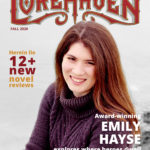Speculative Stories Keep Coming
Thor, a movie based on Greek mythology, has released to good reviews, and the buzz is spreading, but last night I saw my first advertisement for the final Harry Potter movie due out in July.
Apparently these two are merely the dorsal fin breaking the waterline when it comes to speculative movies that will air this summer. One writer claims that one or more speculative movies will release almost every weekend — whether about Greek gods, superheroes, mutants, alien invasions, barbarians, vampires, zombies, evil mermaids, robots, boy wizards, magic or the cosmic. Titles include Pirates of the Caribbean: On Stranger Tides; X-Men: First Class; Green Lantern; Transformers: Dark of the Moon; Harry Potter and the Deathly Hallows, Part 2; Another Earth; Cowboys & Aliens; The Future; and many more (click here to view trailers for these movies).Apparently movies don’t have a corner on the speculative market this year. Examiner.com reports that in the fall, all TV networks are “actually catering to the sci fi and fantasy viewer by showing some interesting shows…” Some of the new titles include NBC’s Grimm and Fox’s Terra Nova.
I have several thoughts about this apparent burst of speculative stories. First, I suspect the technological advances that make it possible for movie makers to render the fantastic in a realistic way explain in part the increased number of speculative films.
In addition, I believe our postmodern culture is more open to the fantastic — whether spiritual, magical, futuristic, or alien — whereas the rationalism of the modern era discouraged such “flights of fancy.”
Supernatural stories on the little or big screen undoubtedly bode well for books. The two media seem inter-dependent. Some of the movies were born from previous print sources (books or comic books), and these movies, in turn, will foster new works of a similar kind.
The question is, where will the Christian writer fit into this explosion?
Some Christian publishers such as AMG and Zonderkidz seem to be embracing the speculative genre and are adding writers. Some authors who haven’t found a home in the Christian side of the publishing world or who wish to write for a wider audience are turning to general market houses as R. J. Anderson did. Others are seeking publication with small, independent publishers such as Marcher Lord Press and Splashdown Books. Still others are looking to self-publish, either through one of the established companies such as WinePress Publishing, through Amazon, or through one of the new self-publishing imprints traditional publishers have introduced.
Clearly, Christian speculative literature is keeping pace with the culture, though the Wild Wild West which the book industry has become makes it difficult to know how readers will actually find the books they long to read.
Perhaps a service like the Christian Science Fiction and Fantasy Blog Tour or a community like Speculative Faith will serve as the new “gatekeepers” to let readers know what good books are out there.
What do you think? Right now, how do you find the books you read? Are you open to ebooks as much as to print books? To books by authors you’ve never heard of as much as to ones by authors who have a publishing history?
Do you rely on the opinion of a collection of readers and writers to make your book selections? For example, do you look at reviews at places like Goodreads or Amazon to help you decide which books to buy?
In your opinion, what’s the best way for readers to find the books they would love? Looking forward to your ideas.











































I tend to read authors I’m familar with, or can get free, or recommended by friends of mine.
Yep you can’t shoot a blaster without hitting some spec-fic movie this summer. And the TV shows are just about as thick. Even saw two new ones previewed this weekend (girl with ancient cat powers and aliens invade earth (not V)).
Here’s my stab at answering the questions.
Right now, how do you find the books you read?
Right now I mostly find them by browsing and word of mouth through blogs or forums. Though I don’t spend a lot of time searching for new books as my reading list is already overflowing. To get a new book now basically I have to really be intrigued by the story or concept.
Are you open to ebooks as much as to print books?
Right now i’m actually more open to ebooks than print books just because I’m finding them easier and quicker to read. Plus it can be more economical. But I’m really just finding it more convenient to read ebooks and tag books I’d like to check up on by downloading a sample of them for later reference.
To books by authors you’ve never heard of as much as to ones by authors who have a publishing history?
This really depends on the story/concept of the book. I’ll give more leeway to authors that I’ve enjoyed in the past, but if a book’s concept grips me I’ll give it a try.
Do you rely on the opinion of a collection of readers and writers to make your book selections?
I’ll check on reviews if they’re available, but the cover copy and first few pages make more of an impact on whether I’ll end up gettign the book.
For example, do you look at reviews at places like Goodreads or Amazon to help you decide which books to buy?
I generally only look at reviews at the point of sale, like Amazon, unless I stumble across the review in general browsing. But like I said earlier, reading a sample and the book blurb hold more weight with me than reviews when the time to pay comes.
But the BEST way for readers to find books they would love? Find people who generally like the same kind of stories you do and listen to what they are reading. And just browse around, and see if anything catches your eye. And take risks in reading, especially if you can get samples easily. You never know if something you think sounds weird but interesting could beocme your new favorite book.
Ditto on everything Stuart said (is that cheating? 😉
And I am absolutely stoked that the world is starting to become as weird as me!
Stuart, thanks for taking time to answer all the questions — for Morgan, too, as it urns out. 😆 Seriously, these are the things I think are helpful to know.
I guess if I’m asking others these questions, I might as well answer, too.
Right now, how do you find the books you read? Word of mouth almost exclusively.
Are you open to ebooks as much as to print books? I am deviceless, so right now I’m only open to print books.
To books by authors you’ve never heard of as much as to ones by authors who have a publishing history? If a reliable source recommends a book by an author I’m unfamiliar with, I’ll give it a try. After that, I’ll continue reading authors I enjoyed.
Do you rely on the opinion of a collection of readers and writers to make your book selections? For example, do you look at reviews at places like Goodreads or Amazon to help you decide which books to buy? I don’t intentionally look for reading recommendations in those places, but if I’m wondering how a book is being received, I’ll read those reviews and they might sway me (but probably not).
In your opinion, what’s the best way for readers to find the books they would love? This is the question I want everyone else to answer. In the new publishing realm, are we still going to rely on the books put out by traditional publishers? How are we to find the good ebooks out there? But perhaps things won’t be so very different — the people I trust will sill talk up the books they like, and those will be the ones I’m apt to buy.
Becky
I just bought a spec fic book today (dystopian). Bought an e-copy. The book is by a Christian author and published by Harper Teen and it debuted at number 6 on the NY Times Bestseller List. Who says Christians can’t write and sell spec fic? Ye-haw!
I learned about the book from a friend and fellow Christian spec fic lover/blogger/writer. I do buy books I read about on blogs. I do read reviews online. I will never buy a book unless I can read the first chapter free to see if I want the book. Covers and first chapters are important to me in deciding to buy a book.
I do like e-books better than print books. I do stay away from self-published e-books because there are just too many of them to wade through. But if someone I knew and respected recommended a self-pubbed e-book, I’d give it a shot. So, yes, I do think that CSFF and Speculative Faith and other bloggers who have similar tastes to my own can act as gatekeepers.
The best way to find books I love? Blogs.
Word of mouth is the biggest way for me to check out a book. Then like Sally said (cheating again :)) I check out the first chapter and cover. I know one should not judge a book by its cover but if the quality of the cover is poor, I figure what is inside is poor as well. I also might read reviews, but hearing a friend rave about a book will move me to buy it faster.
Great post… but Thor is Norse mythology, not Greek!! lol 🙂
Right now, how do you find the books you read?
Finding books, yes that is THE issue. I browse bookstores, the library, Amazon, and read reviews on the blogs I follow. My latest blog post is actually asking for reading suggestions.
Are you open to ebooks as much as to print books?
Yes.
To books by authors you’ve never heard of as much as to ones by authors who have a publishing history?
I tend to stick with what I like when I find it, but need some help finding Authors I will like.
Do you rely on the opinion of a collection of readers and writers to make your book selections?
I take suggestions from anyone willing to give their opinion, but I usually also read reviews, and read the first couple pages before I decide to try a book or not. I hate wasting my time on something that I can’t really get into.
For example, do you look at reviews at places like Goodreads or Amazon to help you decide which books to buy?
Yes. And I’ve been influenced by reviews at The Rabbit Room too.
I SO wish there was something that does for books what Pandora does for music. That books were not just placed into broad shelving categories, by target age groups, target belief systems, target “genre” preferences- and would instead be searchable by qualities that are less subjective and more concrete characteristics of particular books.
I believe the print bookstores are going out of business because it is so hard to go through all those shelves of books to find NEW material that will interest a particular reader. You have to know exactly what you are looking for to find it. If I know exactly what I’m looking for I’ve probably already Googled it, and if I found it on-line, and read the reviews on-line, why not purchase it there? If only they had little computer stations where I could type in titles, authors, or qualities that I know I like and get a result list of suggestions based on the similarity to what I like.
If books in a bookstore were searchable by book characteristics and reviews instantly available in the store, now that is a place I would love to shop- to have all of that and be able to hold the book in my hand before purchasing, that would trump Amazon easily. Unfortunately it does not yet exist.